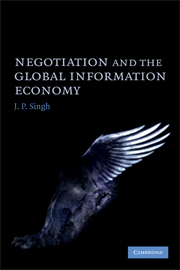Book contents
- Frontmatter
- Contents
- List of figures
- List of tables
- List of acronyms
- Preface
- 1 Introduction
- 2 Power, interests, and negotiations
- 3 Services and intellectual property: multilateral framework negotiations
- 4 Cultural industries and telecommunications: multilateral sectoral negotiations
- 5 Infrastructure pricing negotiations: evaluating alternatives when facing a significant market power
- 6 Electronic commerce: reaching agreement when facing market power in Internet governance and data privacy
- 7 Conclusion: power and governance
- Bibliography
- Index
3 - Services and intellectual property: multilateral framework negotiations
Published online by Cambridge University Press: 29 June 2009
- Frontmatter
- Contents
- List of figures
- List of tables
- List of acronyms
- Preface
- 1 Introduction
- 2 Power, interests, and negotiations
- 3 Services and intellectual property: multilateral framework negotiations
- 4 Cultural industries and telecommunications: multilateral sectoral negotiations
- 5 Infrastructure pricing negotiations: evaluating alternatives when facing a significant market power
- 6 Electronic commerce: reaching agreement when facing market power in Internet governance and data privacy
- 7 Conclusion: power and governance
- Bibliography
- Index
Summary
It could be contended in fact that diplomacy as an organized profession owed as much to commercial interests as to political interests…The Venetian diplomatic service, which undoubtedly laid the foundations of professional diplomacy, was in its origin a commercial machinery.
Harold Nicholson DiplomacyMultilateral negotiations are a good starting point for studying the effects of overlapping power configurations in the global information economy. Predominantly a feature of the second half of twentieth century, these negotiations are representative both of globalization processes and the emergent diffusion of power. But multilateralism itself does not mean that a diffusion of power prevails; it is only likely to do so. This chapter examines the underlying empirical circumstances for such a power configuration.
Two multilateral negotiations, administered by the World Trade Organization, are examined here that are of utmost importance to the global information economy. The WTO, and its predecessor the General Agreement on Tariffs and Trade (GATT), is widely recognized as the most important international body concerned with economic negotiations. GATT is credited with eight rounds of multilateral trade negotiations starting in 1947; the ninth round called the ‘Doha Development Round’ was formally launched in November 2001 and is on-going.
The agreements that emerged from GATT at the conclusion of the Uruguay Round (1986–94) are: the General Agreement on Trade in Services (GATS) and the Trade-Related Aspects of Intellectual Property Services (TRIPS). Services and intellectual property, and the international agreements governing these issues, are at the core of the global information economy.
- Type
- Chapter
- Information
- Negotiation and the Global Information Economy , pp. 76 - 116Publisher: Cambridge University PressPrint publication year: 2008



